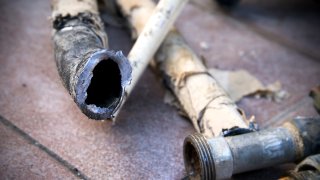
Hundreds of public water systems in New Jersey must take inventory of their lead pipes and replace them over the next decade under a new law Democratic Gov. Phil Murphy signed Thursday.
The law makes New Jersey the latest state, along with California, Illinois, Michigan and Ohio, to call for an inventory of how many lead pipes carry drinking water to residents. Lead is not safe at any level to ingest and leads to developmental problems for children.
“This is a crisis that has been building for decades, and in some cases, centuries,” Murphy said Thursday, and noted that two-thirds of housing stock in New Jersey predates 1980, several years before lead-based solder was banned in plumbing.
More than 225,000 New Jersey children were diagnosed with elevated blood lead levels between 2000 and 2015, said Sean Jackson, CEO of Isles, a Trenton-based nonprofit community development and environmental organization.
Get top local stories in Philly delivered to you every morning. Sign up for NBC Philadelphia's News Headlines newsletter.
The issue made headlines in 2019, with Newark and Trenton beginning to identify and replace lead service lines. Newark embarked on an aggressive program and is on the verge of completing replacement of about 20,000 lead service lines. But with the COVID-19 pandemic preoccupying government and residents alike over the last year and a half, lead remediation declined in visibility.
It's back in the spotlight because of the new law, which sets several benchmarks for water systems to meet. Supporters of the bill — which passed without any opposition in the Legislature — say it's about time that lawmakers move forward with tracking and replacing lead pipes.
One persistent criticism, though, has been a provision of the law that allows water systems to pass at least part of the cost of the job onto customers. The price tag is yet to be determined, but nonpartisan legislative analysts estimated the initial inventory could cost local water systems $29 million and replacement could tally $2.65 billion.
Local
Breaking news and the stories that matter to your neighborhood.
Gary Brune, a policy manager at the nonprofit, nonpartisan New Jersey Future group, said the law's authorization that customers carry some of the cost is a big, concerning issue for cities and towns with poorer residents.
The bill sets several benchmarks: Within 30 days of enactment, an initial inventory of lead service lines and unknown pipes must be compiled; that initial inventory must be sent to the state Department of Environmental Protection within six months, with a more detailed report in a year and follow-up reports two years after enactment until all the lead pipes are replaced. The goal is to have all lead service lines replaced within 10 years.
Customers must also get notification if their pipes contain lead, no later than 30 days after the initial inventory. And no later than one year from enactment, water systems must give the DEP a plan to replace the lead plumbing, which would be updated annually.
There are nearly 600 community water systems in the state, with about 2.4 million total pipes.
Public records obtained by the Associated Press show that an inventory requested by DEP is already underway. Those records show responses from about 450 of the systems, with about 850,000 pipes of unknown substances. About 145,000 have lead or galvanized metals, which are slated for replacement under the new law. The DEP records identify about 960,000 lines for replacement — a category that includes the unknown lines.



